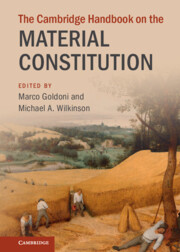Book contents
- The Cambridge Handbook on the Material Constitution
- The Cambridge Handbook on the Material Constitution
- Copyright page
- Contents
- Contributors
- Introduction
- Part I History
- Part II Challenges
- 11 The Material Constitution and Imperialism
- 12 The Material Constitution of Federations
- 13 The Materialist Turn in Constitutional Thought
- 14 Three Registers of the Material Constitution
- 15 What Matter(s)? A Processual View of the Material Constitution
- 16 The Material Constitution and the Rule of Recognition
- 17 Constitutional Matter and Form
- Part III Analyses
- Index
14 - Three Registers of the Material Constitution
from Part II - Challenges
Published online by Cambridge University Press: 15 January 2023
- The Cambridge Handbook on the Material Constitution
- The Cambridge Handbook on the Material Constitution
- Copyright page
- Contents
- Contributors
- Introduction
- Part I History
- Part II Challenges
- 11 The Material Constitution and Imperialism
- 12 The Material Constitution of Federations
- 13 The Materialist Turn in Constitutional Thought
- 14 Three Registers of the Material Constitution
- 15 What Matter(s)? A Processual View of the Material Constitution
- 16 The Material Constitution and the Rule of Recognition
- 17 Constitutional Matter and Form
- Part III Analyses
- Index
Summary
This chapter discusses the conceptual benefits and drawbacks of the notion of the material constitution from the standpoint of a sympathetic critic. It proceeds by identifying three separate but overlapping registers in which the concept is invoked; as an ideologically inflected and often politically charged rhetorical contrast with the formal legal constitution, as thetheoretical fulcrum of a particular explanatory scheme and as a general methodological orientation towards generousconsideration of the bearingof non-legal factors upon constitutional outcomes. The rhetorical roots and the narrower theoretical understandings of the concept can leave it mired in disagreement and even confusion over the fluid terms and implications of the binary opposition typically drawn with the non-material dimension of the constitution. As a general methodological framework it holds much more promise, although questions remain over whether broader adjectival concerns with the various dimensions of material constitutionality might provide a more flexible methodological opening than a focus on the ‘material constitution’ asa discrete polity-specific object.
- Type
- Chapter
- Information
- The Cambridge Handbook on the Material Constitution , pp. 210 - 222Publisher: Cambridge University PressPrint publication year: 2023

